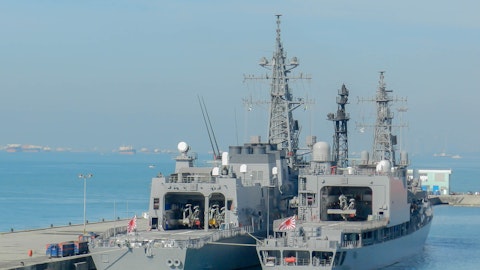Stuart Bradie: Yeah, I mean, we’re hiring just slightly ahead of the curve there. I think we’re, our team is doing extremely well and we’ve got a large presence in India that allows us a little bit of a relief valve there and we’ve got a terrific lady who leads that business and it’s highly respected in the marketplace. So, we’re able to attract real talent and diversify talent, which is terrific. So, I think so far, so good and there will become, I’m sure, constraints in certain elements like in the world’s gone past and things like in the process side and things like that. But so far, we’re keeping on pace and no real issues. We’ve got a very strong recruitment team, but I think ultimately, where we sit in the marketplace around sustainable solutions is a big draw for talent, particularly younger talent, they really value being part of a Company that’s actually trying to address climate change issues and de-carbonization semantics as well as the work we do in government around security and sustaining a way of life and things like that.
So, it’s, our overall reputation helps where we are in the markets and the things we do help, but we really look after our people once they’re here and recruitment is only one aspect. I think retention is another aspect and certainly we’re doing very well in that area. So, I think so far, so good.
Samantha Stiroh: Okay, great. I’ll keep it to one. Thank you.
Operator: Our final question today comes from Sahil Manocha of Citibank. Please go ahead.
Sahil Manocha: Hi, good morning. This is Sahil Manocha for Andy Kaplan. So, another government shutdown deadline is approaching in November. Could you provide some color on how a short to medium term shutdown could impact the government solutions business?
Stuart Bradie: Yeah, thanks. Thanks, Sahil. Well, I mean, I’m sure lots of companies that do what we do are getting that question. For us, this is nothing new. I mean, it seems to happen every year, whether it’s a CR or a short shutdown and I think we’ve proven year after year we’re very resilient. We understand what we’re doing. We’re, remember that our SPS business and our government international business is completely immune to that. So, we’ve got some inbuilt immunity. We’ve got a lot of funding on what I would call tip of the spear critical operational missions and, whether that’s in Europe or the space station or whatever, it doesn’t matter where, and the intelligence, what we do across our whole defense portfolio. So, we’re not concerned about that.
I think ultimately it’s, we’ve been engaged in it so many times. And I’m sure the answer is the same for many of our peers in the government realm. So, yeah, not, I mean, it’s one of those things that would be great to be avoided, but if it does happen, I don’t think it’s going to impact KBR too much.
Sahil Manocha: That’s helpful. And then I know you provided some color on your, in the opening remarks, but could you just provide an update on your plans to settle the remaining warrants, which mature in the first half of 2024? Has a decision been made on whether they’ll be settled in cash or shares?
Stuart Bradie: Yeah, I think it depends how we go. I mean, we’re not allowed to, under the rules of engagement, to start that dialogue with the warrant holders until we’re in the open window, which we will be in tomorrow. So, we can start that negotiation. And as Mark said, if we can cut a reasonable deal around premiums and things, we have options to settle in an accelerated fashion. I think the interesting fact pattern around that is that if we do decide, depending on how negotiations go, to settle early, it will be quite a reduction in share count for the year, the way these things are calculated, that will push up our EPS for 2023, a bit just because of share count. So, there’s some good fact patterns there to be taken into consideration as well. So, Mark, any more color on that?


